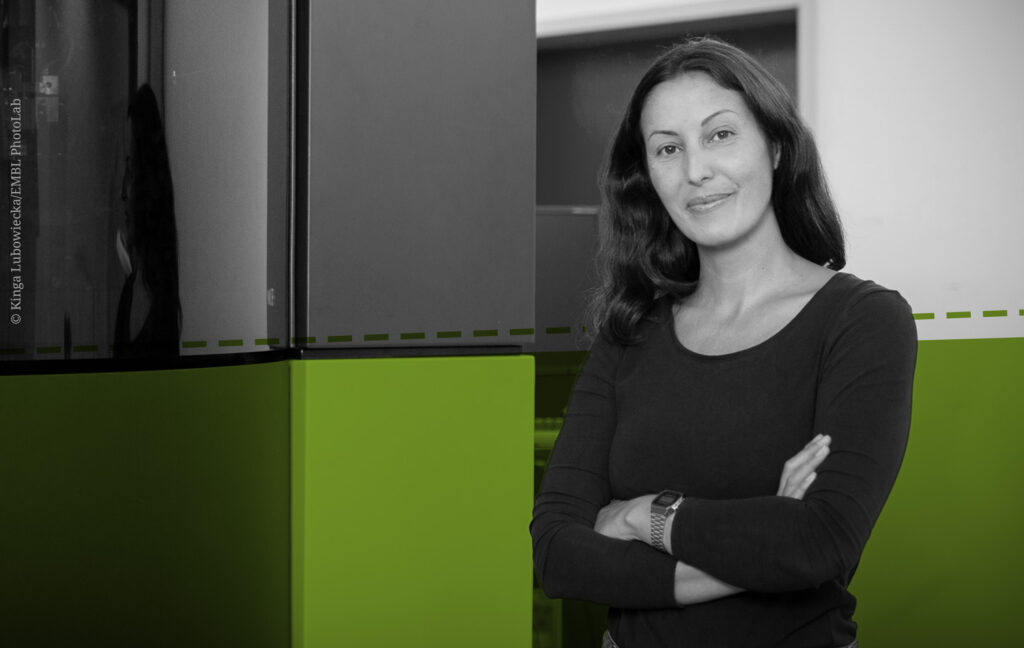6 June 2023 – Julia Mahamid of EMBL Heidelberg, Germany, has just been announced as the recipient of the EMBO Gold Medal 2023. She talked to EMBO about her career path, interdisciplinary research, collaboration and mentoring.
You studied biology, then moved into structural chemistry and work in structural cell biology today. What inspired these moves?
Switches between fields sometimes happen completely by serendipity. My switch from biology to chemistry was related to meeting my PhD supervisor, who was doing something very different from what I had thought biology was. It was supramolecular chemistry, still handling biological systems but with a very different perspective. Looking at biology through the eyes of a chemist or material scientist intrigued me. Since then, I have embraced interdisciplinary research that combines different perspectives to look at a certain problem and get the full picture.
How do you make crossing several disciplines work?
I’ve learned it by switching between fields myself. You come into a field as a novice, need to learn the literature and new methods, and also bring in your fresh perspective. I find this challenge is interesting on its own. Now I enjoy working with collaborators and think it’s necessary in modern research, which requires advanced technologies and expertise. I fully acknowledge that I can’t be an expert in everything. So it’s smart to collaborate and join forces with an expert in another area.
What is the most exciting aspect of your current research?
I keep being amazed by how biology is still surprising us. We’ve been studying it for decades. But every new method, microscopy or model system reveals things that we couldn’t even imagine. The high-resolution imaging techniques we use allow us to look at things without any labels. It can be confusing, because we don’t necessarily know what is most important to follow up on. But it puts us in a unique position where we don’t assume anything, rather look and learn from what we see, coming up with new hypotheses about how biology works differently in different organisms or conditions.
What’s next?
So far, we have focused on the structural-molecular scale in single-cell models. But as we are solving the major technical challenges for these relatively simply systems, we become increasingly intrigued by more complex systems. How does structural biology relate to different cell types or specific micro-environments in multi-cellular systems? This question forces us to go into areas of imaging in which we are not experts yet. We will try to combine imaging technologies across scales and other methods to understand this complex biology. In the coming years we will expand our research towards multicellularity in tissues and in vitro organoid models.
What does the EMBO Gold Medal mean to you?
It’s a recognition of the creativity and perseverance of my group members. Our projects are extremely challenging on the technical and conceptual level. My group members and I constantly need to leave our comfort zones and think outside the box. For me the EMBO Gold Medal is a confirmation that the way that I’ve been trying to steer my research, which is usually exploratory and more directed by a hunch than target-oriented, eventually does make sense.
What is your approach to leading a research group, and has it changed since you have become a group leader?
My leadership style is guided by a mindset of being part of my team. I recruit scientists from many different backgrounds. Each person brings in their unique knowledge and perspective, and we teach each other. My approach must have changed over the years, because we all change, and the group has its own dynamics. Until recently, I was very hands-on, collecting and analyzing data together with group members. Nowadays I look at things from a bit further away, allowing me to have a birds-eye view on our research and drive projects with this view.
What have you learned from your successes and failures that you pass on to aspiring scientists?
My most interesting learning experience was from my master’s research: it was great but taught me what I shouldn’t do for the rest of my life. It was a very important lesson. It’s equally important to know what you’re good at, and what you’re not good at or don’t like. You should steer into a direction where you will mostly use your strengths and enjoy the work, and come up with strategies to overcome your weaknesses.



